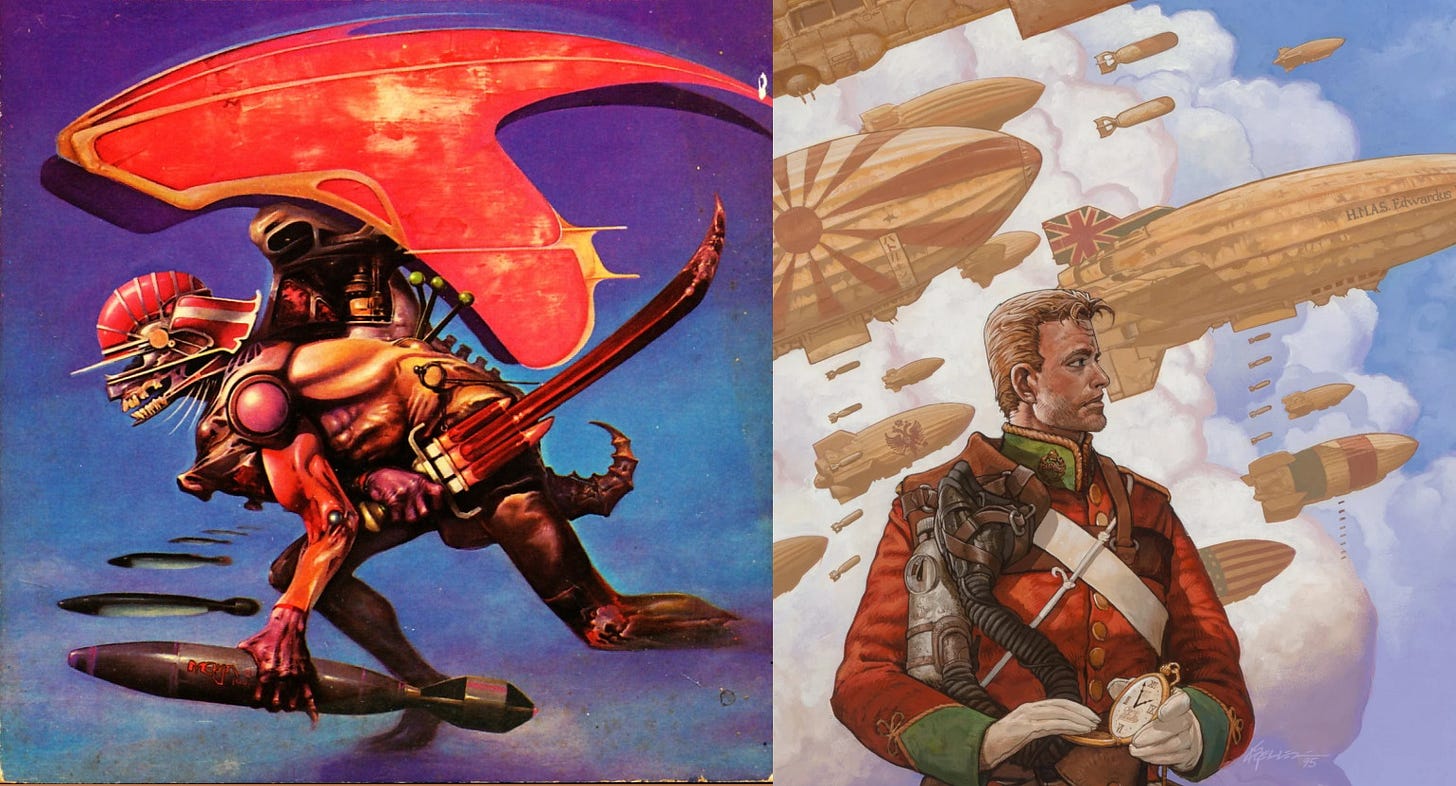Our Own Responsibility
Moorcock's nomad of the time streams, Oswald Bastable, and the insanity of the human condition
“I have been fated, for a reason I cannot comprehend or for no reason at all, to witness the worst examples of insane warfare (and all warfare, it seems to me now, is that) and having to listen to the most ridiculous explanations as to its ‘necessity’ from otherwise perfectly rational people, I have long since become weary, Moorcock, of the debate. If I appear to you to be in a more reconciled mood than when your grandfather first met me it is because I have learned that no individual is responsible for War - that we are all, at the same time, individually responsible for the ills of the human condition. In learning this - and I am about to tell you how I learned it - I learned a certain tolerance for myself and for others which I had never previously possessed.” - Michael Moorcock
In his third and final ‘scientific romance’, written in tribute to H.G. Wells, Moorcock reimagines the second World War as a clash between the Russian Empire and Imperial Japan. I get the sense that The Warlord of the Air, the first ever ‘steampunk’ novel, had been written as a one-off, but it enjoyed some success and his agent or publisher encouraged Moorcock to write more about his ‘nomad of the time streams’. Whatever its background, The Steel Tsar is resolutely the last of the Oswald Bastable novels, concluding his reflections on the inevitability and contingency of historical events, the relationship between empire and racism, and the insanity of warfare.
One of the purposes of The Steel Tsar (beyond its role as an adventure story) is to savage the ideological excesses of the U.S.S.R. by remounting their circumstances. Bastable, the late Victorian captain, finds himself once again thrown into wars that begin this time (rather than end) with a nuclear bomb, here obliterating Singapore. Taken as a prisoner of war by the Japanese, he meets both Nestor Makhno, the leader (in our world) of the ‘Black Anarchists’ in what is today Ukraine, and also Birchington, a British engineer with a naïve love for the idea of a perfect governing system, whom Bastable, Makhno and their fellow P.O.W.’s find immensely tedious.
After they are rescued from the camp, Bastable finds himself signing up as an airship captain in the service of the Russians, but is deeply troubled by orders to bomb Cossack rebels who are led by a zealous theocratic demagogue known as the Steel Tsar. Josef Djugashvili (the name under which Stalin was born) is a grim caricature of the historical figure, who in this world perpetually wears a helm styled in a demonic visage. Since both are fighting from Ukranian soil, Makhno and Djugashvili briefly become allies, but Moorcock’s romantic version of Makhno (a historical figure Moorcock has always been fascinated by) is disgusted by the the Steel Tsar’s brazen lack of honour, and ultimately breaks with him. The tiresome engineer Birchington, however, is captivated by Djugashvili promises of systematic order... a fancy that eventually gets him killed in the most brutal fashion by a steel automaton of his own creation.
This is a war adventure story with philosophical depths. As the opening quote expresses, Moorcock places the blame for endless military conflict at everyone’s doorstep, evoking a concept of individual collective responsibility, an idea I have also argued for. Moorcock finds war flowing from the confluence of idealism, impatience, and despair, and the events of history emerging from a confused jumble of virtue and vice. He expressly suggests that we are “all victims of our own imagination”. War can only be evoked as a ‘necessity’, because to engage in insanity one must believe it is unavoidable. Today, this same political demon has spread far beyond the battlefield.
Moorcock’s abiding belief about history, expressed in these novels and many of the Jerry Cornelius stories (who share in common the character of the temporal adventurer Una Persson), is that disrupting the tragedy of historical events takes tremendous effort, and the outcome of any such attempt is never certain. We are naïve, therefore, when we substitute simplistic moralism for ethical principles - this path slides inexorably towards catastrophe. As Bastable confesses, while we all share responsibility for the “ills of the human condition”, simplistic solutions only escalate each crisis. The problems of humanity cannot be solved by grand systems, nor by rose-tinted wishing for a lost past, but solely by our taking responsibility for ourselves.



